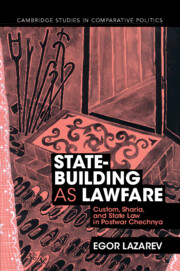Book contents
- State-Building as Lawfare
- Cambridge Studies in Comparative Politics
- State-Building as Lawfare
- Copyright page
- Dedication
- Contents
- Figures and Tables
- Acknowledgments
- Introduction
- Part I Theory and Ethnography
- Part II Lawfare and Political Order
- 3 The Chechen Way
- 4 “There Are No Camels in Chechnya!”
- 5 “We Will Use Every Resource!”
- Part III Lawfare and Social Order
- References
- Index
- Other Books in the Series (continued from page ii)
4 - “There Are No Camels in Chechnya!”
Lawfare during the Independence Period
from Part II - Lawfare and Political Order
Published online by Cambridge University Press: 02 February 2023
- State-Building as Lawfare
- Cambridge Studies in Comparative Politics
- State-Building as Lawfare
- Copyright page
- Dedication
- Contents
- Figures and Tables
- Acknowledgments
- Introduction
- Part I Theory and Ethnography
- Part II Lawfare and Political Order
- 3 The Chechen Way
- 4 “There Are No Camels in Chechnya!”
- 5 “We Will Use Every Resource!”
- Part III Lawfare and Social Order
- References
- Index
- Other Books in the Series (continued from page ii)
Summary
This chapter covers the turbulent period of the de facto independent Chechnya in the 1990s, characterized by the resurgence of traditionalism and religion. The war that broke out between Moscow and Chechen separatists in 1994 reduced state capacity to rubble and made the ideology of political Islam dominant among Chechen politicians. After the end of the First Chechen War in 1996, the victorious separatist leaders enacted Sharia. This chapter contends that promotion of Sharia in independent Chechnya was not driven by ideology or demand by the population. It shows that this strategy was used by incumbents to increase their legitimacy by association with religion and tradition, through distance from the Kremlin, and with concessions to the powerful constituency of former rebels. At the same time, the incumbents were wary of strengthening the non-state forums too much, because they were afraid that powerful legal systems based on tradition and religion would become arenas of political contestation and ultimately be hijacked by the opposition. The rulers turned to promotion of Sharia and custom only when they were directly challenged and needed to reinforce political control regardless of the costs.
Information
- Type
- Chapter
- Information
- State-Building as LawfareCustom, Sharia, and State Law in Postwar Chechnya, pp. 119 - 141Publisher: Cambridge University PressPrint publication year: 2023
